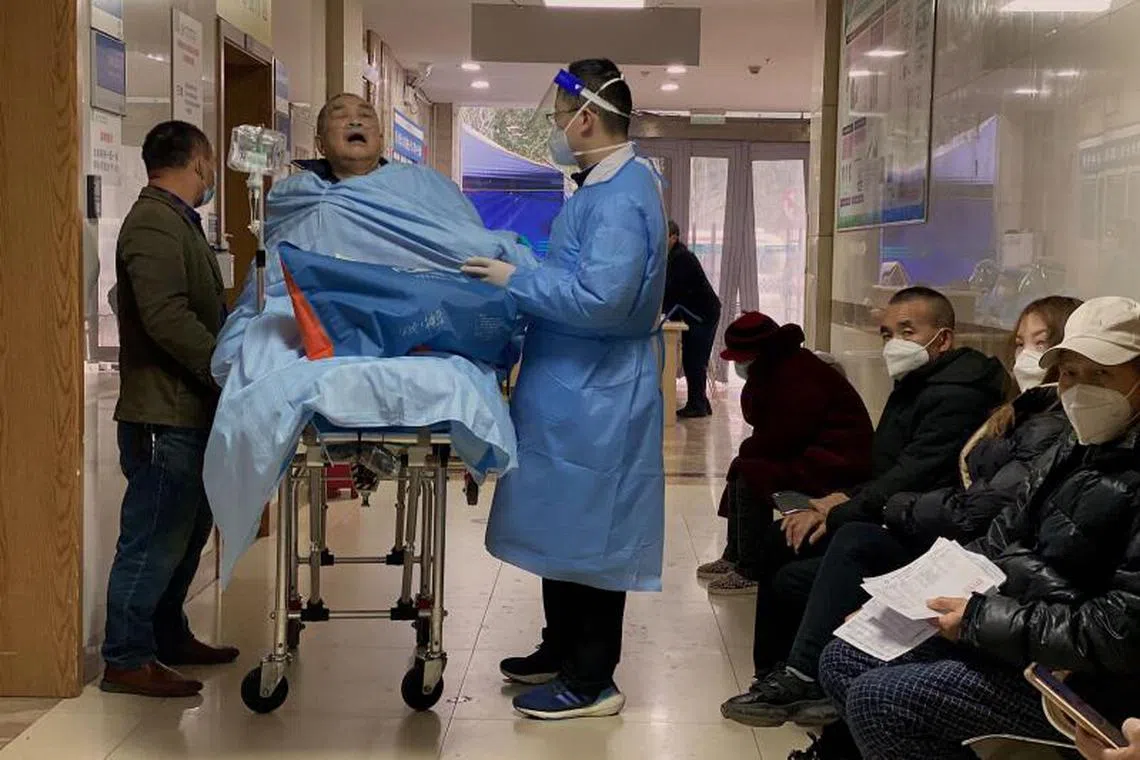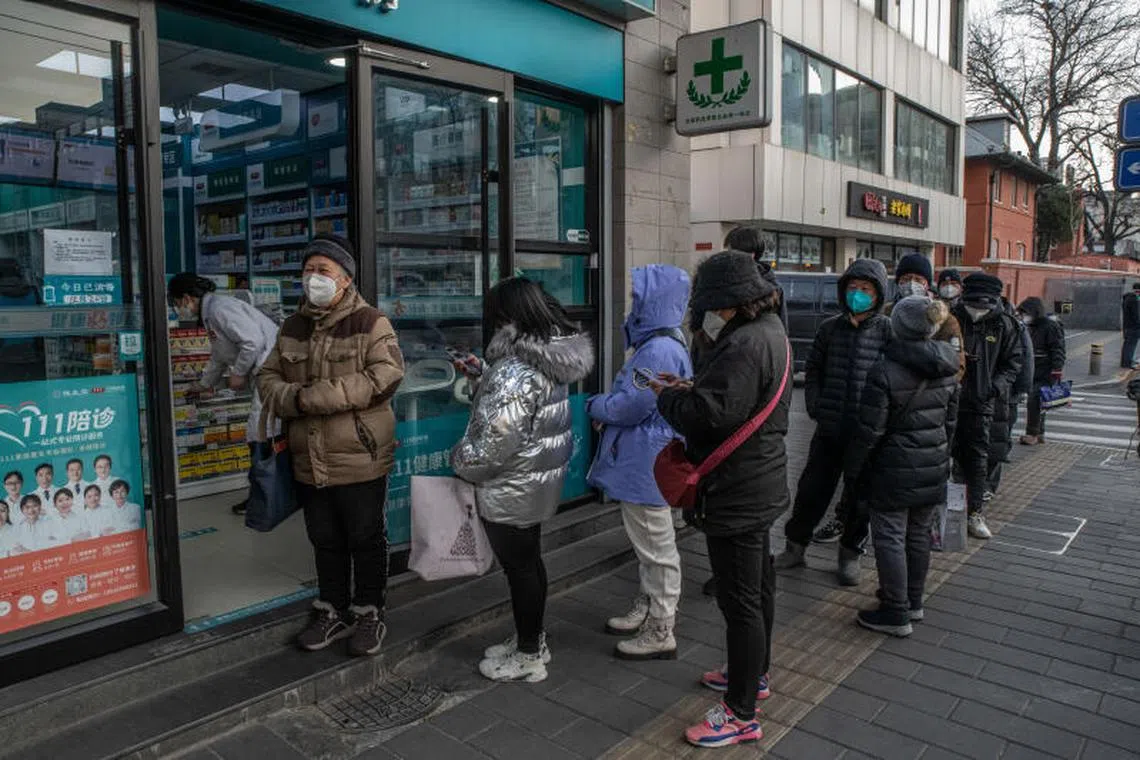Without a Covid-19 narrative, China’s censors are not sure what to do
Sign up now: Get ST's newsletters delivered to your inbox

Chinese official media still hasn’t offered much guidance from top leaders on the situation.
PHOTO: AFP
Follow topic:
BEIJING - Since China dropped its strict “zero-Covid” policy,
Three men who don’t know each other sit in a prison cell. Each explains why he was arrested: “I opposed Covid testing.” “I supported Covid testing.” “I conducted Covid testing.”
The joke has yet to be broadly censored. It is a sign of just how much the Communist Party of China, usually a master of messaging, is struggling to come up with a coherent explanation for the policy shift and a clear directive for what to do with an explosion of cases now threatening the country’s medical resources.
So dizzying was the switch that even two weeks later, the state’s powerful propaganda and censorship system has yet to catch up to the flood of confusion and criticism seeping through the country’s typically tight Internet controls.
Apart from laying out the new Covid-19 rules, Chinese official media still hasn’t offered much guidance from top leaders on the situation.
The country’s hundreds of thousands of Internet censors, experts say, haven’t got guidance on what to allow and what to delete – and may be confused, given that what was blocked a month ago is now official policy.
Many Chinese have been asking why they put up with years of harsh lockdowns and travel restrictions,
For China’s leadership, maintaining public trust hinges, in part, on a difficult task: finding a narrative that makes sense of the reversal.
In the weeks since “zero-Covid” ended, China’s all-encompassing propaganda and censorship machine has fallen into its old routine of deleting negative press and spreading “positive energy” posts that praise the struggles of individuals and the government. But experts said the three-year trauma caused by the stringent pandemic measures and the last-minute U-turn will prove hard for people to quickly move past.
“It will be impossible for everyone to forget completely. Many will remember ‘zero-Covid’ deeply and clearly” said Assistant Professor Fang Kecheng from the Chinese University of Hong Kong who studies China’s propaganda. However, that may not lead to widespread loss of confidence in the government, he added, noting that “people still have ways to convince themselves that things don’t seem so bad now.”
Thus far, propagandists have hewed to past norms in handling the crisis. They have avoided excessive mentions of the policy shift, instead emphasising social stability.
State media has sympathetically called the situation “stressful” but otherwise portrayed it as a well-orchestrated decision to overcome a virus that is no longer as deadly as it once was.
Across the country, an acute shortage of medicine,
Anger soon erupted online, with many accusing authorities of double standards based on their frequent and detailed reports of Covid-19 death statistics from overseas, particularly Europe and the United States. Many used the hashtag #WhatIsTheCriteriaForDeathByCovid in complaints Tuesday. By Wednesday, censors had begun to block such posts.
People wrote about their relatives’ deaths, urging others not to trust propaganda that Covid-19 is now like a flu. A blood bank appealed to college students for urgent donations. Cancellations of travel reservations for the upcoming Chinese New Year holiday surged as people decided to stay home.
State media coverage of the country’s top leadership has steered clear of the ongoing outbreak. On Monday, a commentary on People’s Daily justified the new policy, saying it will bring about a “significant positive effect” on economic recovery. While the piece said “a lot of work is to be done,” it stopped short of acknowledging the chaos it created.
“I don’t think I’ve seen a planned or orchestrated propaganda plan coming out. It’s more because the general direction has changed, so the propaganda has to follow suit suddenly,” Assistant Prof Fang said. One major test will come when the virus spreads to smaller, rural areas with insufficient medical resources, he said.

People queuing at a hospital pharmacy in Beijing, on Dec 20, 2022.
PHOTO: NYTIMES
A small but vocal chorus online has called out the abrupt and disjointed policy changes. Mr Asong Yu, 30, a finance worker in north-eastern China, has questioned in sardonic and indirect ways the sudden changes and the lack of explanation.
In one post, Mr Yu shared a response from viral artificial-intelligence powered chatbot, ChatGPT, to the prompt, “are there pigs that can do a 180?”
He had particular vitriol for those he called “epidemic prevention enthusiasts,” nationalists who had previously parroted the government’s position on “zero-Covid,” only to be jilted by Beijing’s about-face. Online he called them: “abandoned dogs being beaten by their owners.”
“The previous propaganda is completely opposite to the current one. I think, however stupid some people might be, they will have to wake up,” Mr Yu said in an interview.
So far, Mr Yu’s posts have avoided the censors’ knife. In part, that’s because there are no obvious ways to deal with such a major about-face. Censors must decide whether to delete some portion of official posts supporting “zero-Covid” for years, and how much to tolerate a new zeal for the lifting of lockdowns. NYTIMES

